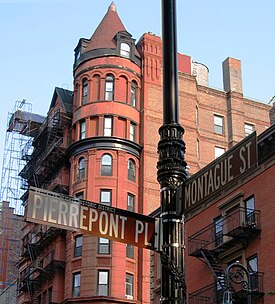Brooklyn Heights, New York
| Brooklyn Heights | |
|---|---|
| Neighborhood of Brooklyn | |

62 Montague Street between Pierrepont Place and Hicks Street in Brooklyn Heights (2006)
|
|
| Location in New York City | |
| Coordinates: 40°41′44″N 73°59′42″W / 40.69556°N 73.99500°WCoordinates: 40°41′44″N 73°59′42″W / 40.69556°N 73.99500°W | |
| Country |
|
| State |
|
| City | New York City |
| Borough | Brooklyn |
| Languages | |
| Area | |
| • Total | 0.320 sq mi (0.83 km2) |
| Population (2010) | |
| • Total | 20,256 |
| • Density | 63,000/sq mi (24,000/km2) |
| Demographics 2010 | |
| • White | 77% |
| • Black | 7% |
| • Hispanic (of any race) | 8% |
| • Asian | 5% |
| • Other | 3% |
| ZIP Codes | 11201 |
| Median household income | $119,999 |
Brooklyn Heights is an affluent residential neighborhood within the New York City borough of Brooklyn. Originally referred to as Brooklyn Village, it has been a prominent area of Brooklyn since 1834. The neighborhood is noted for its low-rise architecture and its many brownstone rowhouses, most of them built prior to the Civil War. It also has an abundance of notable churches and other religious institutions. Brooklyn's first art gallery, the Brooklyn Arts Gallery, was opened in Brooklyn Heights in 1958. In 1965, a large part of Brooklyn Heights was protected from unchecked development by the creation of the Brooklyn Heights Historic District, the first such district in New York City. The district was added to the National Register of Historic Places in 1966.
Directly across the East River from Manhattan and connected to it by subways and regular ferry service, Brooklyn Heights is also easily accessible from Downtown Brooklyn. The neighborhood stretches from Old Fulton Street near the Brooklyn Bridge south to Atlantic Avenue and from the Brooklyn-Queens Expressway to Court Street and Cadman Plaza West. Adjacent neighborhoods are Dumbo, Downtown Brooklyn, Cobble Hill, and Boerum Hill. Columbia Heights, an upscale six-block-long street next to the Brooklyn Heights Promenade, is sometimes considered to be its own neighborhood.
...
Wikipedia



